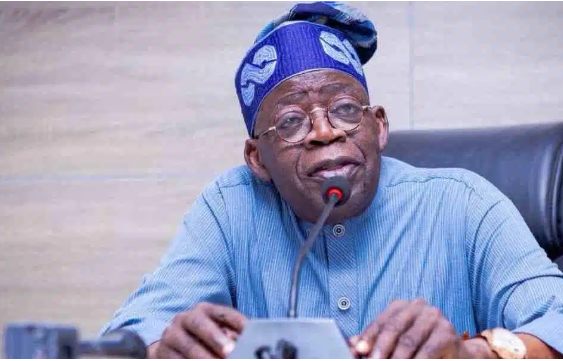

President Bola Ahmed Tinubu has assured Nigerians that the escalating cost of food has been brought under control, leading to a significant reduction in hunger across the country.
Speaking on Sunday during a Sallah homage visit by the Minister of the Federal Capital Territory (FCT), Nyesom Wike, and a delegation at the Presidential Villa in Abuja, Tinubu expressed optimism about the economic situation.
The President emphasized that recent policy changes had contributed to stabilizing food prices and improving the living conditions of Nigerians. He particularly pointed to the removal of the FCT from the Treasury Single Account (TSA) as a crucial step in accelerating development in key areas.
“I started looking at the opening up of the rural areas, the residence of the vice president that has been abandoned for years came alive. The health centers were being rehabilitated. The health facilities of the residents of FCT are being upgraded. Our teachers at school are being rehabilitated, buildings are furnished. Thank you, Wike,” Tinubu stated.
The President highlighted that security across the nation had improved and that economic activities were gradually stabilizing, leading to a more comfortable life for Nigerians.
“Today, we are living in peace, and security is improving. There is satisfaction in our output. Hunger is coming down. Food prices are lowering. We are able to go to the market and do business,” he added.
His remarks come at a time when Nigerians have been grappling with the effects of inflation and a high cost of living. The past months have seen rising food prices, making basic necessities less affordable for many households. However, Tinubu’s comments suggest that his administration’s economic policies are beginning to yield positive results.
The President\'s statement has sparked mixed reactions among Nigerians, with some expressing relief at the possibility of improved food affordability, while others remain skeptical given the persistent economic challenges. Many citizens have continued to voice concerns over their struggles to afford essential commodities despite the government\'s assurances.
In response to the President\'s claims, market observers and economic analysts have noted that while food prices have seen slight reductions in certain areas, the overall cost of living remains high. Inflation rates, particularly for food items, continue to fluctuate, with many Nigerians still finding it difficult to make ends meet.
Reports from major markets across the country indicate that while there has been some price reduction in staple food items such as rice and beans, the decrease is not yet substantial enough to provide widespread relief. Traders and consumers alike have called for more sustainable measures to ensure long-term food affordability.
The Federal Government has maintained that its agricultural policies and economic reforms are designed to address food insecurity and create a more stable market environment. Some of these policies include investment in local food production, agricultural grants, and the reduction of import dependency.
While these initiatives have been praised in some quarters, critics argue that the government needs to do more to ensure that the cost of essential goods remains affordable for the average Nigerian. Issues such as high transportation costs, currency fluctuations, and supply chain disruptions have all contributed to food price volatility.
Many Nigerians have called on the government to implement additional relief measures, including subsidies and direct financial support to vulnerable households. They argue that while long-term economic reforms are essential, immediate interventions are necessary to alleviate the suffering of millions struggling with food insecurity.
Social media reactions to Tinubu’s statement have been varied. Some citizens have shared testimonies of experiencing slight reductions in food prices, while others insist that they have not seen any noticeable changes in their local markets. The ongoing debate highlights the complexity of Nigeria’s economic challenges and the differing perspectives on the government\'s efforts.
Beyond food prices, Tinubu also emphasized improvements in other sectors, including education, healthcare, and infrastructure. He reiterated his commitment to ensuring that Nigerians benefit from the administration\'s policies and reforms.
The President\'s praise for Wike’s leadership in the FCT was also a key highlight of his address. He commended the minister for his role in revitalizing the capital, rehabilitating health facilities, and improving living conditions for residents.
However, some opposition figures and economic analysts have questioned the administration\'s claims, urging the government to provide more data and transparency regarding its economic policies. They argue that while some progress has been made, the impact is not yet widespread enough to justify Tinubu’s assertions.
The conversation surrounding food prices and economic stability is expected to continue in the coming weeks, with many Nigerians eagerly watching for further developments. As the country navigates its economic challenges, citizens remain hopeful that meaningful changes will take place to ease their financial burdens.
For now, the reality for many Nigerians remains a struggle to afford basic necessities. While the government celebrates what it views as progress, the experiences of ordinary citizens will ultimately determine the success or failure of these economic policies.
As the debate continues, Nigerians are looking to the government for not just words, but tangible actions that will bring lasting economic relief and food security to all.
In addition to government efforts, various non-governmental organizations (NGOs) and international agencies have been working to alleviate food insecurity in Nigeria. Programs focusing on food distribution, agricultural development, and financial aid for farmers have played a crucial role in mitigating the effects of high food prices.
However, experts warn that without long-term structural changes, food prices could continue to fluctuate, leaving millions at risk of hunger and malnutrition. The government has been urged to improve policies on food storage, invest in modern agricultural techniques, and enhance the distribution network to reduce post-harvest losses.
While some Nigerians appreciate the President\'s optimism, many believe that more immediate steps need to be taken to address the crisis. The cost of fuel, transportation, and foreign exchange rates are critical factors influencing food prices, and unless these issues are tackled, affordability will remain a challenge.
Despite these concerns, the government remains confident in its approach, reiterating its commitment to improving the nation\'s economic conditions. The coming months will be crucial in determining whether these policies will lead to substantial and lasting relief for Nigerians.
For many citizens, the question remains: will these economic measures truly lead to long-term stability, or are they temporary fixes that fail to address the root causes of food insecurity? The answer will unfold as the government\'s policies continue to take effect, and as Nigerians navigate the realities of everyday survival in a challenging economic climate.


